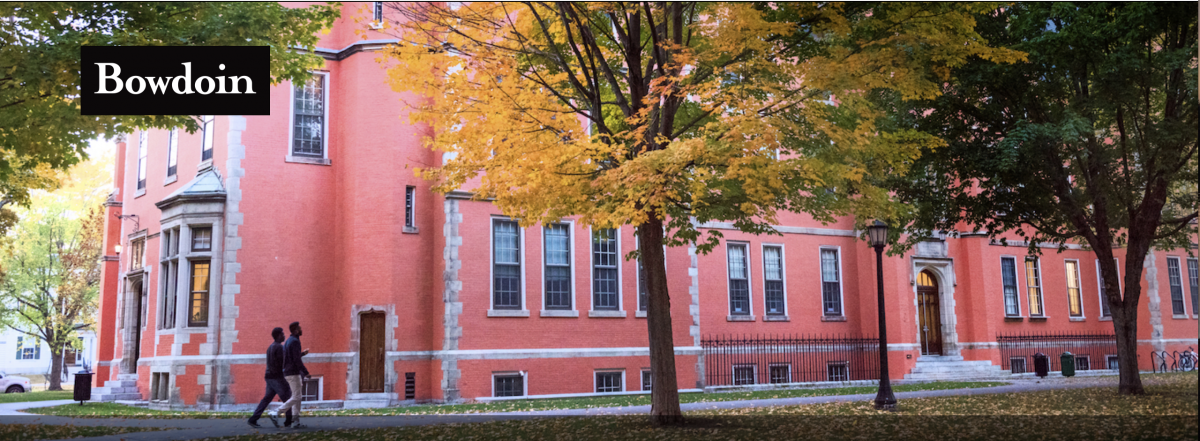- What data did you collect?/What is your initial impression of the data?For this section, I collected data regarding Bowdoin’s philosophy. First and foremost, this includes the Offer of the College, which is as stated below:
TO BE AT HOME in all lands and all ages;To count Nature a familiar acquaintance, and Art an intimate friend;To gain a standard for the appreciation of others’ work
And the criticism of your own;
To carry the keys of the world’s library in your pocket,
And feel its resources behind you in whatever task you undertake;
To make hosts of friends… Who are to be leaders in all walks of life;
To lose yourself in generous enthusiasms
And cooperate with others for common ends –
This is the offer of the college for the best four years of your life.
Though important to how Bowdoin operates because administrators, professors, and the admissions office constantly refers to it, I did not particularly find anything useful from it that I could draw form to support my argument. It is a speech from William DeWitt Hyde that speaks pretty generally on subjects that no majority would disagree is a good education. I have decided not to spend too much time and effort in utilizing the Offer of the College to make my argument, so I will put this on hold.
However, while on the official Bowdoin page under “The Offer of the College”, I saw an elaboration of what a liberal education is, which is stated below:
“A liberal arts education cultivates the mind and the imagination; encourages seeking after truth, meaning, and beauty; awakens an appreciation of past traditions and present challenges; fosters joy in learning and sharing that learning with others; supports taking the intellectual risks required to explore the unknown, test new ideas, and enter into constructive debate; and builds the foundation for making principled judgments.
It hones the capacity for critical and open intellectual inquiry—the interest in asking questions, challenging assumptions, seeking answers, and reaching conclusions supported by logic and evidence. A Bowdoin education rests fundamentally on the free exchange of ideas—on conversation and questioning—that thrives in classrooms, lecture halls, laboratories, studios, dining halls, playing fields, and dormitory rooms. Ultimately, a liberal arts education promotes independent thinking, individual action, and social responsibility. Graduates should leave Bowdoin with the ability to engage competing views critically, to make principled judgments that inform their practice, and to work effectively with others as informed citizens, committed to constructing a just and sustainable world.”
(https://www.bowdoin.edu/about/the-offer/index.html)
How have the data you have collected this week changed/progressed your thinking about your research project?
David Harvey defines Neoliberalism as “in the first instance a theory of political economic practices that proposes that human well-being can best be advanced by liberating individual entrepreneurial freedoms and skills within an institutional framework characterized by strong private property rights, free markets, and free trade” (Harvey, 2005).
The Bowdoin website’s description is particularly interesting because of rhetoric and certain characterizations of the Bowdoin classroom. For example, the quote really pushes students to share and learn with others and “take intellectual risks required to explore the unknown, test new ideas, and builds the foundation for making principled judgments”, which to me strongly reflects an entrepreneurial mindset and approach towards education. Secondly, the idea of that “A Bowdoin education rests fundamentally on the free exchange of ideas…that thrives in classrooms, lecture halls, laboratories, studios, dining halls, playing fields, and dormitory rooms” draws strong parallelism of free market and free trade. In this instance, the Bowdoin space is the free market where ideas are being traded. I personally do not agree with this, as Bowdoin is a predominantly white space where certain students (most of whom are white, wealthy, from New England, have been to prep school) who, for the most part, have more confidence, have the rhetoric, have used practiced using certain language, and understand how a classroom very similar to Bowdoin operates. As such, there is no true “free exchange of ideas”– only the idea of such. There is Bowdoin in its actuality versus the ideal type of what it aspires to be, which aligns with neoliberal concepts of free market and free trade. To me, this is reflective of how this definition of a Bowdoin education–on the official website of the college, runs parallel to ideas of neoliberalism. This is not only in its adaptation of neoliberal concepts of free trade and free market of ideas, but also in the issues of its practice–that there is no true “free market” or “free trade” of ideas at Bowdoin. I see a lot
This data–drawing from the school’s official website– has progressed my research project by confirming my hypothesis: that Bowdoin subscribes to neoliberal concepts. To what degree, that is something I have to continue to look for in the research process. I would also have to look at different examples of Bowdoin philosophies that potentially support neoliberalism, such as the Common Good, descriptions of it through the admissions offices, aolumni, etc.
- Harvey, David 2005 A Brief History of Neoliberalism. Oxford; New York: Oxford University Press.
- Bowdoin Website: The Offer of the College and A Liberal Arts Education, https://www.bowdoin.edu/about/the-offer/index.html
Skip to content
Research Portfolio
